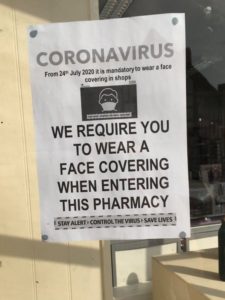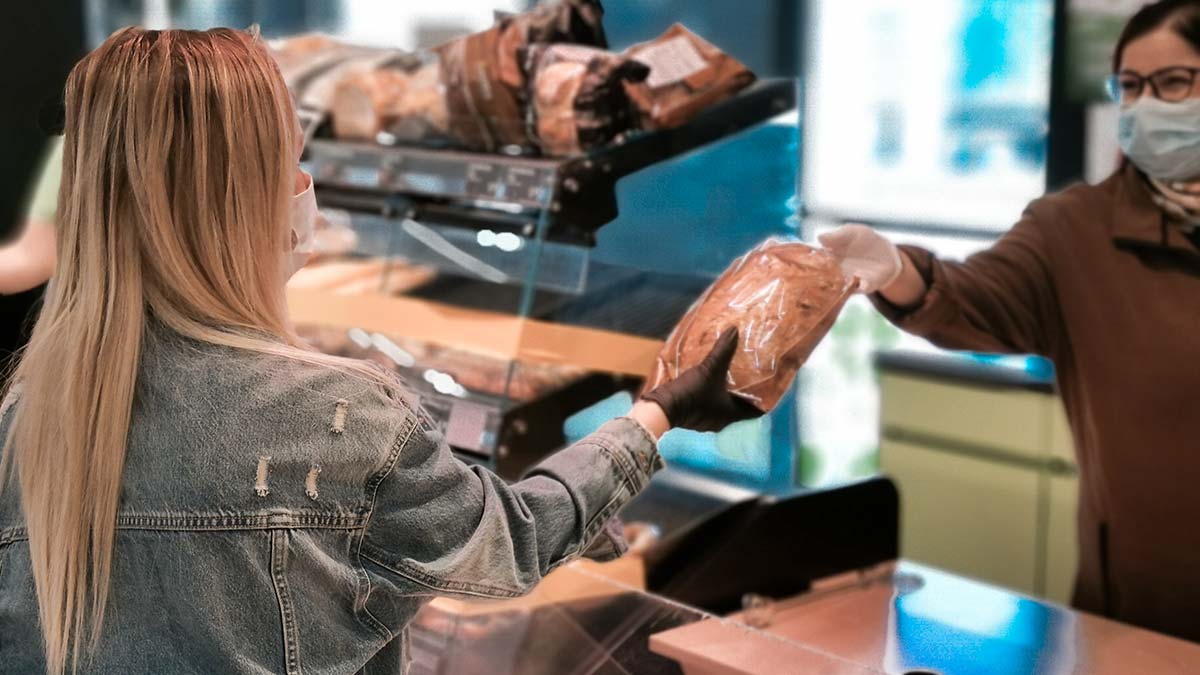What should the role of retail staff be in protecting our health? Do they have to fight a culture war as well as the disease?
“London is empty” chorused our friends “and there’s practically no-one on the trains”. How exciting, we thought. Time to visit, if only for the sheer weirdness of it.
Only by the time we got there, the trains (the cheaper ones anyway) were filling up and the streets far from empty, although nothing like as full as they would normally be in August. No tourists, no commuters: just people like us, wondering around a little bemused, a little saddened and not a little scared.
The National Gallery is open, bookings only. Walking up those monumental steps in the Sainsbury Wing with not another soul in front or behind, we felt like we had broken in to an ancient temple, the gods of which had long since died or departed. There were people, eventually. Numbers are restricted so that there is never a crowd around any single painting. One could stand silently in front of masterpiece after masterpiece, drifting from one to the other at will as if the only buyer at a private viewing. The sense of privilege, of riches, guiltily luxurious.
And everyone wore a mask, or nearly everyone. One chap (guess what: white, in his 50s) dropped his around his chin. He went from room to room, unchallenged by any of the attendants. Yet as soon as someone so much as raised a phone near a painting, they would spring-up wagging their finger and bark ‘No pictures!’ in that not-quite-a-whisper they all have.
Why that way round? Why give priority to protecting property rather than public health? Why put postcard sales before breathing? Surely putting at risk a few pennies in profit is less important than not dying in agony, taking others with you on the way?
Perhaps I’m being unfair. The Gallery staff could not have been more helpful, showing palpable joy at being able to welcome us all back, beaming at each one of us as we filed in. And should gallery attendants, or shop assistants, join the NHS in the front-line against the pandemic? Can they?
The Health Protection (Coronavirus, Wearing of Face Coverings in a Relevant Place) (England) Regulations 2020 states at Regulation 3 (1)
“No person may, without reasonable excuse, enter or remain within a relevant place without wearing a face covering“.

‘Relevant place’ at the time of our visit did include shops, but galleries were at that point specifically carved out of the Regulation. They are however covered from 8 August, under regulations unpublished as at the time of writing.
It might explain why the attendants said nothing, but it isn’t sufficient reason for it. Government guidance already recommended wearing masks in these settings. Even if attendants couldn’t enforce a request to mask-up, they could make one couldn’t they? People will only return to galleries if they feel safe there, so why not help with that?
The Regulations themselves give no power to the owners or managers of premises to exclude non-mask wearers. That is granted to the police, PCSO’s, Tfl officers and anyone the Secretary of State designates for this purpose. So far, the Secretary has not so-designated the Saturday boy at Sainsbury’s. We are not yet at the point of handing out guns to Traffic Wardens (note to younger readers: that’s an 80’s reference; you had to be there and in some senses thank Heavens none of us were).

Could a shop or gallery exclude people anyway? Most private premises reserve or have the right to exclude people they do not want. In any event, couldn’t shop assistants or gallery attendants ask people to wear a mask, even if they are not going to throw them out if they don’t?
One reason is that people might not have to wear a mask. They may have a ‘reasonable excuse’ not to. Regulation 4 contains the definition and includes, along with a list of relatively unambiguous and practical reasons, a broad category at 4(1)(a) where:
“[A person] cannot put on, wear or remove a face covering—
- because of any physical or mental illness or impairment, or disability (within the meaning of section 6 of the Equality Act 2010(1)), or
- without severe distress”
But just because someone might have either of these reasons not to wear a mask, can they be asked to? What happens if they are? What if the shop or gallery will not let them in?
The answer was clear to one commentator: shops could not even ask non-mask wearers if they were disabled, let alone deny them entry, without facing lots of litigation.
He sent the advice to Waitrose, Sainsbury, Safeway, the Coop, M&S, Waterstones, Debenhams, John Lewis and Boots.
At least one other lawyer had some qualms.
Note the focus on disability discrimination. The second limb of the carve-out – ‘without severe distress’ – would be very difficult to rely on. What constitutes ‘severe distress’ that isn’t already at least a symptom of a disability? That it offends your political views is as likely to get you off as asserting that you are a Freeman on the Land works in avoiding motoring laws.
… there is something corrupting in using the discrimination legislation…to undermine our collective and individual health.
For me, there is something corrupting in using the discrimination legislation – our collective expression of a desire for social justice – to undermine our collective and individual health. I take some satisfaction though that in trying to use the legislation in this way the author, and those who are encouraged by his writing not to wear masks, actually strengthens the legal position of those shops and businesses who look to enforce the rules.
The more self-styled libertarians rail against mask-wearing, the easier it becomes as a matter of legal principle for premises to enforce the rules. Indeed, for the sake of their own staff and other customers, the more it becomes incumbent on them to do so.
Suppose a shop implements a policy of refusing entry to anyone without a mask. Someone who is not wearing the mask because of their disability is thus subject to a detriment. By law, they do not have to wear a mask and yet they cannot come in.
S29 Equality Act 2010 comes to their aid. The section prohibits discrimination against disabled people in their access to services, for this purpose retail ones. They have been subject to: indirect discrimination (the policy has a disproportionate impact on them) and discrimination arising out of a disability (not allowed in because they can’t wear a mask; can’t wear a mask because they’re disabled). Moreover, the shop may have not made ‘reasonable adjustments’ to allow them access.
And if all the shop has done is turn people away, it might lose a subsequent claim. But in any well-run shop, it won’t be.
For example, the assistant can say ‘If you can’t wear a mask for medical reasons, here is what we’ve put in place for you’. What that is depends on the shop, but it could include bringing an order to the door, or allowing people in at specified (less busy) times. The assistant should be polite and sensitive and, in a well-run store, they will be. For example, here is what equalities-specialist and law-centre practitioner Audrey Ludwig suggested.
In doing so, staff responding in this way ‘justify’ the policy of refusing entry. This has the effect of negating both the indirect discrimination and the discrimination arising out of a disability. ‘Justification’ is a proportionate means of achieving a legitimate aim. There can be no serious dispute that the aim – protecting public health – is legitimate. Moreover, given that if people don’t wear masks in shops scientists predict more of them will die, exclusion for non-compliance is likely to be proportionate, provided it is implemented sensitively. ‘Justification’ is no licence for the officious or the oppressive.
It will get better over time as we all get used to this. The training will disseminate further, stores will learn from experience. The first weeks will be difficult, but it will become like putting on a seatbelt when we get into car: simply part of the journey.
Is there a risk of litigation? Of course. There always is. But there’s risk too in not acting. An employer who puts their employees at risk by refusing to enforce can be sued, on top of the commercial risk of being seen as an unsafe place to shop.
In reality though, most mistakes will be corrected by an apology, by a promise to learn so there isn’t a next time. We’re all of us navigating our way through this pandemic, literally wary of bumping into each other as we go. Most of us, most of the time, cut each other a lot of slack in trying to do the right thing.
There remains though the risk of injustice, with disabled people being excluded when they should not be. There are various schemes to mitigate this, such as self-ID cards or lanyards, but they are far from perfect and rely on the good faith of those who can and do access them.
Disabled people will suffer because of those who choose to act in bad-faith. If too many claim not to wear a mask because of a disability, the time needed for courtesy and consideration is eaten up. Shops will need to be more vigilant if they are not needlessly to expose staff and other customers to the threat posed by those who will not comply. If the question is asked, why must the store challenge customers who are not wearing a mask, why can’t they just assume those people are disabled, shops can point to the foamings and dribblings spilling out of the internet from the self-appointed guardians of our liberty promoting non-compliance. Retailers didn’t start the culture-war, nor even this particular skirmish, but they have a job to do.
That said, do they? The Regulations impose no sanction on the operators of premises who do not enforce them. The statute does not compel shops to do anything. As for their staff, the assistant in the comic book store reads Judge Dredd: he didn’t sign-up to become him. In France, customers asked to leave a launderette because they weren’t wearing masks returned with baseball bats. Is it fair – in the ordinary and technical senses – for retailers to ask staff to run this risk?
Should the government have brought in tougher regulations, ones which balanced the health needs of the public in a different way? Should they have at least tweaked the Equality Act to leave retailers less exposed, their staff clearer in their responsibilities?
I don’t know, but for what it’s worth I think probably not. Let’s see how this is working first. I haven’t seen any shops yet refusing entry, but some do request customers to put on a mask at the entrance, to which most sheepishly reach for their pocket or bag and remember to wear the one they’re carrying. We all forgot them in the first few days, but most of us now remember to wear them, most of the time. The ban on smoking on the Tube is self-policed and almost universally observed. Perhaps mask-wearing will follow the same route when we all get used to it.
But if the gentle word and the polite barring of the way do not suffice, and the doctors continue to confirm that wearing masks can make a difference in fighting the virus, we might as a society revisit the obligations on, and protection for, those on whom we find ourselves relying to keep us all safe.
About the author(s)
Jonathan Chamberlain leads for the Technology Sector in Gowling WLG's UK Employment, Labour & Equalities Team. He is a member and past Chair of the Legislative & Policy Committee of the Employment Lawyers' Association, but blogs in a personal capacity.

